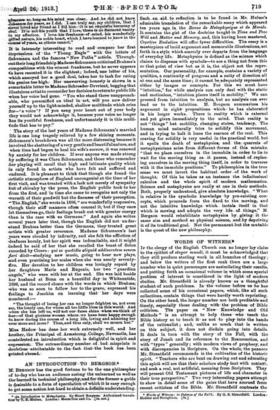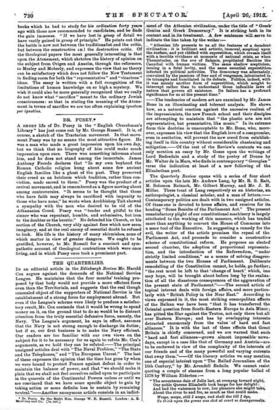WORDS OF WITNESS:*
IF the clergy of the English Church can no longer lay claim to the epithet of stupor mundi, it must be acknowledged that
they still produce sterling work in all_ branches of theology ; and below the writers of the first rank there are a large number who in quiet parsonages are-assimilating their results, and putting forth an occasional volume in which some special problem of interest is considered in the light - of modern studies. Mr. Streatfield is already known as a thoughtful student of such problems. In- the volume- before us he has collected some of his occasional papers, which, like all such collections, contain things that were hardly worth reprinting. On the other hand, the-larger number are both profitable and timely, especially those dealing - with-- the problem - of Bible
criticism. The paper on "New-- Knowledge and Old Methods" is an attempt to help those who teach the
Bible history so to teach it • as not to play into the hands of the rationalist ; and, unlike so much that is written on this subject, it does not disdain going into details.
It deals in turn with the story- of the Fall, with the story of Jonah and its reference to the Resurrection, and with "types" generally ; with modern views of prophecy, and
with discrepancies in Scripture. On the whole, the panacea
Mr. Streatfield recommends is the cultivation of the historic spirit. "Teachers who are bent on drawing out and educating this spirit will see that their scholars study text with context, and seek a real, not artificial, meaning from Scripture. They will present Old Testament pictures of life and character in their true perspective." Two very interesting papers attempt to show in detail some of the gains thai have accrued from recent criticism of the Bible. Mr. Streatfield contrasts the • Words of Witness: in Defiroos of the Faith. By G. S. Stteatfield. London : /fodder and Stoughton. [Ss.] books which he had to study for his ordination forty years ago with those now recommended to candidates, and he finds the gain immense. "If we have lost in grasp of detail we have vastly gained in grasp of principle." He points out that the battle is now not between the traditionalist and the critic, but between the constructive Ln 1 the destructive critic. Of the theological papers the most generally interesting is that upon the Atonement, which sketches the history of opinion on the subject from Origen and Anselm, through the reformers, to Mozley and Moberly, and expresses the view that no theory can be satisfactory which does not follow the New Testament in finding room for both the "representative" and " vicarious " ideas. The essay is written with a full recognition of the limitations of human knowledge on so high a mystery. We wish it could also be more generally recognized that we really do not know what "sacrifice" meant to the ordinary Jewish consciousness: so that in stating the meaning of the Atone- ment in terms of sacrifice we are too often explaining ignotum per ignotius.



























































 Previous page
Previous page